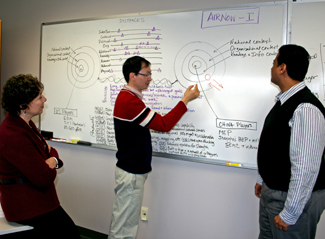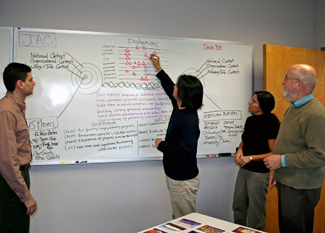Team of International Researchers Meet at CTG to Discuss Transnational Knowledge Networks
 Members of the AIRNow-International Shanghai case study research team discuss the key elements of of a transnational knowledge network. From left to right Sharon Dawes, Lei Zheng, and Mohammed Ghawari.
Members of the AIRNow-International Shanghai case study research team discuss the key elements of of a transnational knowledge network. From left to right Sharon Dawes, Lei Zheng, and Mohammed Ghawari.
Globalization brings problems and opportunities that demand sharing of knowledge, information, and practices across cultural and national boundaries. Environmental quality, international trade, and response to disasters are just a few of the areas where information and knowledge need to cross borders. A team of international researchers met recently at CTG for a two-day workshop to share their findings from research conducted in China, Mexico, and the United States in the area of binational air quality initiatives. They have been working together as a team conducting interviews and collecting data on two case studies as part of a National Science Foundation grant to better understand the character and dynamics of transnational knowledge networks and information systems.
The cases being studied include one in North America and one in China. The North American case involves the Joint Advisory Committee (JAC) for the Improvement of Air Quality in the air basin shared by Ciudad Juárez, Mexico; El Paso, Texas, and Doña Ana County, New Mexico. In the second case study, the US Environmental Protection Agency and the Shanghai Environmental Monitoring Center are jointly developing AIRNow-International Shanghai, an international version of the AIRNow air quality monitoring and reporting system that has been used in the United States since the mid 1990s.
Team members from CTG include Sharon Dawes, Prinicipal Investigator and senior fellow; Brian Burke, senior program associate; Mohammed Ghawari, doctoral candidate at the College of Computing and Information; and Manabu Nakashima, doctoral student at Rockefeller College; as well as CTG Director, Theresa Pardo, and Deputy Director Tony Cresswell. Partners include Lei Zheng (UAlbany ’10), assistant professor, Department of Public Administration, Fudan University, Shanghai, China and Celene Navarrete, lecturer, School of Business Administration and Public Policy, California State University Dominguez Hills.
 Members of the JAC case study research team consider how transnational networks change over time. From left to right Brian Burke, Manabu Nakashima, Celene Navarrete, and Anthony Cresswell.
Members of the JAC case study research team consider how transnational networks change over time. From left to right Brian Burke, Manabu Nakashima, Celene Navarrete, and Anthony Cresswell.
Using the two case studies, the researchers are addressing the following questions:
- How do participants in different countries perceive the dimensions, stakeholders, benefits, and risks of engaging in systems for transnational knowledge and information sharing?
- What are the similarities and differences in these perceptions? What cultural, political, economic, and social factors account for them?
- How do the participants attempt to create shared understanding of technologies, context, terms, processes, and contingencies that generate capabilities for effective action?
- Which strategies, tools, and behaviors are more likely to lead to successful international knowledge networks that benefit individuals, organizations, and communities?
- What preparation, methods, and tools are best suited for research and action on these questions?
This project is also connected to a larger multi-year NSF-funded project at CTG which supported several international working groups focused on various aspects of international digital government. One of these groups, the North American Digital Government Working Group (NADGWG), was formed in early 2007 by researchers and practitioners from a variety of institutions and disciplines in Canada, the United States, and Mexico with the goal of advancing electronic government research across geographic and political boundaries in the region. Members of NADGWG played a major role in conducting the U.S.-Mexico case study.